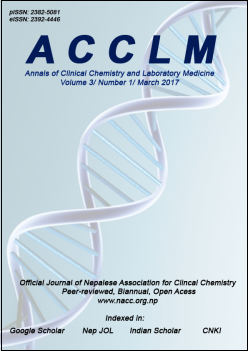Are we appropriately testing for vitamin B12 and folate deficiency?
DOI:
https://doi.org/10.3126/acclm.v3i1.15612Keywords:
vitamin B12, folate, macrocytosis, anaemia, testing, metabolitesAbstract
Background: The most common reason for assessing vitamin B12 and folate status is a clinical suspicion of deficiency along with the haematological abnormality of macrocytic anaemia.However, there is often a lack of a precise clinical or haematological picture to guide the appropriate investigation of these patients. Normal haemoglobin or mean cell volumes are often found, masking the need for appropriate investigation. When abnormal haematological parameters are found, it is often a sign of advanced deficiency. In this study we investigated whether patients with haematological findings of macrocytosis and/or anaemia are appropriately investigated for vitamin B12 and folate deficiencies and whether clinicians request metabolite screening to assist with the diagnosis.
Methods: This was a retrospective audit of data obtained from the laboratory information system for a six month period at a tertiary academic hospital. Adult patients with macrocytosis, anaemia or both were selected and laboratory records reviewed to determine whether they were investigated for vitamin B12 and folate deficiency.
Results: Only 16.2% of patients with macrocytic anaemia, 7.8% of patients with isolated macrocytosis and 6.5% of patients with normocytic anaemia were tested for vitamin B12 and/or folate deficiency. Metabolite assays such as homocysteine and methylmalonic acid were not requested as part of a vitamin status assessment.
Conclusions: In our setting, vitamin B12 and folate assessment is a diagnostic dilemma, delaying identification of potentially debilitating disease. Clinicians need to be informed about earlier investigation and of the availability of metabolite screening and their use in establishing early deficiency.
Downloads
Downloads
Published
How to Cite
Issue
Section
License
Authors who publish with this journal agree to the following terms:
- The author transfers copyright to the Nepalese Association for Clinical Chemistry.
- The journal publishes the work under a Creative Commons Attribution License that allows others to share the work with an acknowledgement of the work's authorship and initial publication in this journal and under the same share-alike license used here.
- Authors are able to enter into separate, additional contractual arrangements for the non-exclusive distribution of the journal's published version of the work (e.g., post it to an institutional repository or publish it in a book), with an acknowledgement of its initial publication in this journal.
- Authors are permitted and encouraged to post their work online (e.g., in institutional repositories or on their website) prior to and during the submission process, as it can lead to productive exchanges, as well as earlier and greater citation of published work (See The Effect of Open Access).




